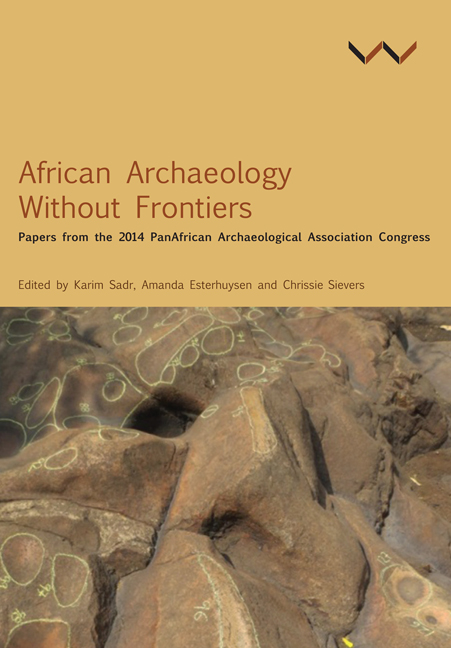 African Archaeology Without Frontiers
African Archaeology Without Frontiers Book contents
- Frontmatter
- Contents
- Acknowledgements
- List of Figures and Tables
- Introduction: An Invitation Fulfilled
- Keynote Address 1: Imagining an African Archaeology Without Frontiers
- Keynote Address 2: A Continental Vision for African Archaeology
- 1 The ‘Useable’ Archaeology of African Farming Systems
- 2 Defining Cultural Heritage among the Makonde of Tanzania
- 3 The Indigenous Roots of Swahili Culture in Pangani Bay, Tanzania
- 4 Is This an Anvil? Iron Bloom Crushing Sites in Northern Togo
- 5 L'art Rupestre au Cameroun, Nouvelles Découvertes et Contribution à L'iconographie Sous-Régionale
- 6 Archaeology and History in Iron Age Settlements in the Congo Basin
- 7 Learning from Glass Trade Beads at Thabadimasego, Botswana
- 8 Blurring Boundaries: Forager–Farmer Interactions in the Middle Limpopo Valley
- 9 Heritage Management and the World Wide Web: South African Challenges
- Contributors
- Index
7 - Learning from Glass Trade Beads at Thabadimasego, Botswana
Published online by Cambridge University Press: 15 March 2018
- Frontmatter
- Contents
- Acknowledgements
- List of Figures and Tables
- Introduction: An Invitation Fulfilled
- Keynote Address 1: Imagining an African Archaeology Without Frontiers
- Keynote Address 2: A Continental Vision for African Archaeology
- 1 The ‘Useable’ Archaeology of African Farming Systems
- 2 Defining Cultural Heritage among the Makonde of Tanzania
- 3 The Indigenous Roots of Swahili Culture in Pangani Bay, Tanzania
- 4 Is This an Anvil? Iron Bloom Crushing Sites in Northern Togo
- 5 L'art Rupestre au Cameroun, Nouvelles Découvertes et Contribution à L'iconographie Sous-Régionale
- 6 Archaeology and History in Iron Age Settlements in the Congo Basin
- 7 Learning from Glass Trade Beads at Thabadimasego, Botswana
- 8 Blurring Boundaries: Forager–Farmer Interactions in the Middle Limpopo Valley
- 9 Heritage Management and the World Wide Web: South African Challenges
- Contributors
- Index
Summary
Abstract
In this paper we present the results of recent laser ablation-inductively coupled plasma-mass spectrometry analysis (LA-ICP-MS) of an assemblage of glass beads from Thabadimasego, an Early Iron Age site in northeast Botswana. Glass beads of Middle East and South Asian origins have been recovered from numerous sites across southern Africa and offer important evidence of trading connections both within southern Africa as well as between the subcontinent and other regions participating in the vast Indian Ocean trade network of the time. Results of the Thabadimasego bead analysis indicate that the site participated in some of the earliest manifestations of this exchange system.
Introduction
Early Iron Age (EIA) settlements in southern Africa are broadly characterised as small Bantu-speaking agricultural communities that were more or less self-sustaining in terms of subsistence but nevertheless maintained extensive economic and cultural relationships with one another (Mitchell & Whitelaw 2005; Huffman 2007). These relationships involved, to a greater or lesser degree over the centuries, the exchange of both bulk and luxury items. Some of these goods were local products and some, such as glass beads, were acquired via connections to trading networks further abroad across eastern coastal Africa and glass-producing regions across the Indian Ocean (Pwiti 1991; Popelka et al. 2005; Robertshaw et al. 2010). For the southern African EIA, access to and control over the foreign goods exchange network has been cited as a potentially important factor in the development of social complexity (Hall 1987; Huffman 2000). In this paper we discuss the results of recent research which places the involvement of Zhizo-era sites in north-east Botswana in the luxury goods exchange network from an early date (figure 7.1).
During excavations in 2012, approximately 40 glass beads were recovered from Thabadimasego, a small site on the Mosu Escarpment in north-east Botswana dated to the ninth century (figure 7.2). An additional handful was recovered from a test unit at site 16-A1-12, located on the nearest escarpment protrusion to the west of Thabadimasego. The glass beads were part of a larger assemblage excavated from both sites, which included hundreds of decorated ceramic sherds, faunal remains, shell beads, metal objects and carbonised seeds.
- Type
- Chapter
- Information
- African Archaeology Without FrontiersPapers from the 2014 PanAfrican Archaeological Association Congress, pp. 127 - 142Publisher: Wits University PressPrint publication year: 2016


